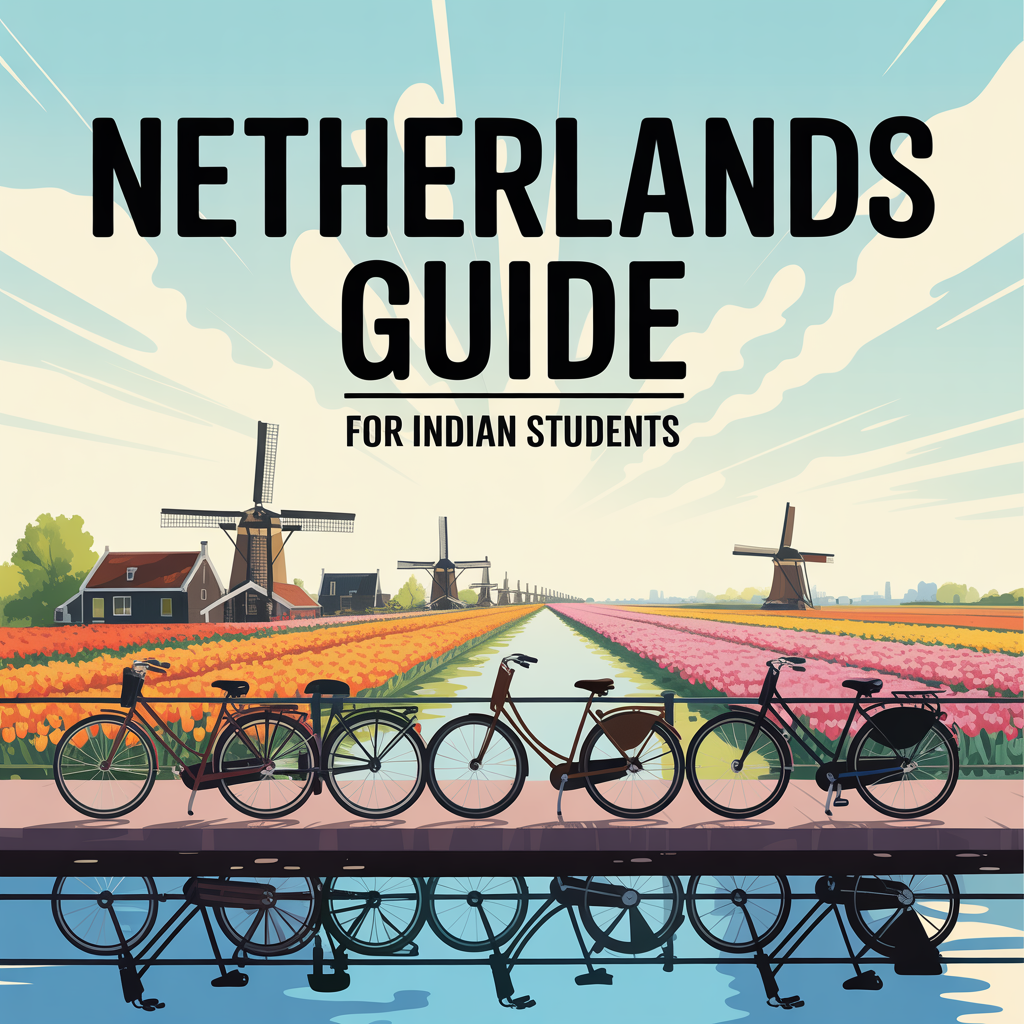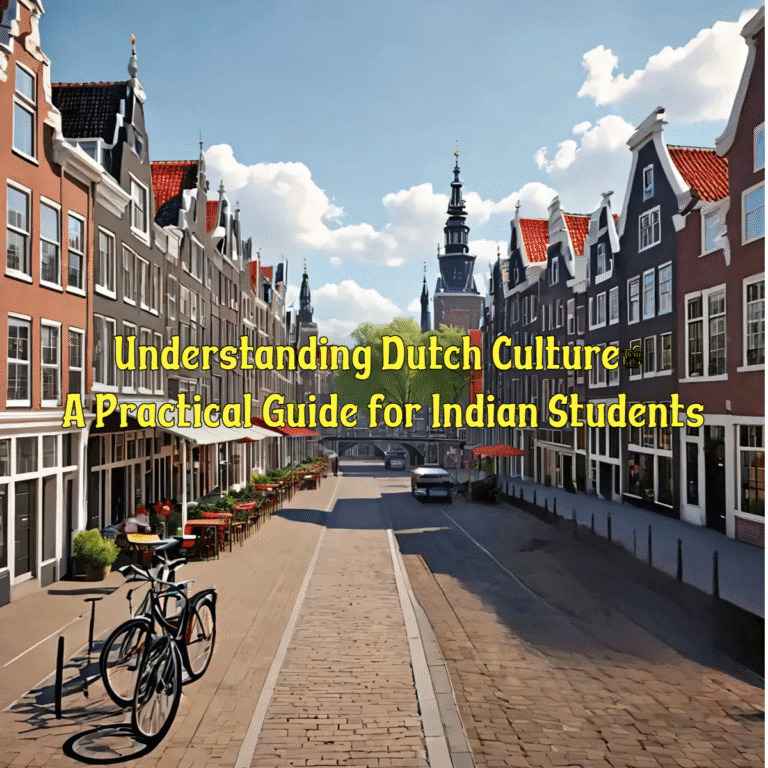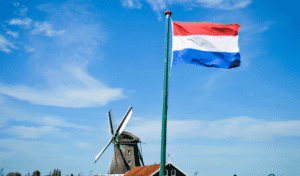
The Netherlands, with its iconic windmills, vibrant tulip fields, and welcoming multicultural cities, has become an increasingly popular destination for Indian students looking to pursue higher education abroad. Home to prestigious universities such as the University of Amsterdam and Delft University of Technology, the country offers a world-class academic environment. However, studying abroad involves more than just academic rigor—it requires adapting to a new culture and lifestyle, which can come with unexpected challenges.
Understanding and navigating cultural differences is crucial for Indian students to thrive both academically and personally during their time in the Netherlands.
This comprehensive guide highlights five key cultural adaptations Indian students often experience, backed by practical advice, real-life insights, and essential facts to help smooth your transition.
1. Dutch Directness: Embracing Honest Communication

One of the most notable cultural differences Indian students will encounter is the Dutch communication style, famously known for its directness. Whereas Indian communication often values politeness, subtlety, and indirect cues aimed at maintaining harmony, the Dutch tend to be straightforward and candid.
Professors and classmates in the Netherlands may openly critique your ideas, challenge your viewpoints in discussions, or provide feedback without much cushioning. This directness, though sometimes perceived as blunt or rude by newcomers, is actually a form of respect and honesty. It fosters clarity, reduces misunderstandings, and supports constructive dialogue.
Tips to Adapt:
– Take feedback as a learning opportunity: Don’t internalise critiques as personal attacks. Instead, view them as ways to improve your skills and knowledge.
– Practice clear and straightforward communication: Gradually shape your own communication to be more direct while remaining polite.
– Ask questions: If you’re unsure or feel uncomfortable, asking for clarification helps in understanding intent.
– Observe and mirror: Pay attention to how locals communicate in academic and social scenarios to learn the appropriate tone.
Fact: According to a survey by EF Education First, Dutch people rank among the top cultures for directness in communication worldwide, reflecting a societal preference for transparency.
2. Social Life: Smaller Circles and Slower Friendships

Social interactions in the Netherlands often differ significantly from those in India. Indian culture is renowned for its extensive family networks, vibrant community events, and frequent social gatherings—encompassing not only extended families but also wider circles of acquaintances. Conversely, Dutch social life revolves around smaller, tightly knit groups of friends who deeply value loyalty and trust.
Newly arrived Indian students might initially feel lonely or find it harder to break into established social circles. The Dutch tend to be reserved and may take their time to develop new friendships.
Strategies to Build Connections:
– Join student clubs and associations: Universities like Amsterdam and Delft have numerous clubs representing cultural, academic, and recreational interests.
– Attend cultural and university events: Participation helps you meet like-minded peers and eases integration.
– Take initiative: Invite classmates for coffee or group study sessions to build rapport slowly.
– Be patient: Genuine Dutch friendships develop over time—consistency and sincerity pay off.
Insight: The Netherlands scores high on the Individualism index (80/100 by Hofstede Insights), indicating a preference for independence and privacy, which shape their social dynamics.
3. The Dutch Plate: Simple and Different

Food can be a major area where Indian students face cultural differences. Indian cuisine is richly spiced and diverse, often forming the centerpiece of social life. In contrast, traditional Dutch cuisine tends to be simpler, with staples including bread, cheese, potatoes, and meat, and much less emphasis on spices or complex flavors.
Meals are also consumed on different schedules. Breakfast and lunch are usually light (often sandwiches or bread with cheese/cold cuts), and dinner, the main meal, is eaten relatively early, typically around 6 PM. This can feel unusual compared to the often late and elaborate dinner traditions in India.
How to Adjust:
– Explore local supermarkets and markets: Fresh produce is abundant and affordable, enabling you to cook familiar dishes.
– Seek out Indian grocery stores and restaurants: Major cities like Amsterdam and Rotterdam host a range of Indian and South Asian food outlets.
– Connect over cooking: Sharing recipes and meals with fellow Indian or international students can provide comfort and build community.
– Try Dutch foods with an open mind: Sampling local specialities like stroopwafels, herring, or poffertjes can enrich your cultural experience.
Fact: According to the Netherlands Board of Tourism, the country’s multicultural cities feature over 130 international cuisines, reflecting the diverse resident population.
4. Finding Your Tribe: Indian Communities in the Netherlands

While the Indian diaspora in the Netherlands is growing, it remains smaller and less concentrated than in popular hubs like the UK or the US. Nevertheless, there are active Indian student organizations and cultural groups in university towns such as Amsterdam, Rotterdam, and Eindhoven. These communities offer a supportive environment that can ease homesickness and provide cultural continuity.
Ways to Engage:
– Join Indian student associations: These groups host festivals like Diwali, Holi, and other cultural events.
– Use social media and forums: Platforms like Facebook and WhatsApp have Indian student groups for networking and advice.
– Attend multicultural events: Universities often organize intercultural gatherings, promoting interaction between diverse student bodies.
– Volunteer or participate in community activities: Active involvement can expand your network and enhance your cultural adjustment.
Insight: Cultural connections positively impact well-being and acculturation, as noted in studies by the International Journal of Intercultural Relations.
5. Cycling Culture: Your New Favourite Way to Explore

Cycling is not just a transport option but an intrinsic part of Dutch life and identity. The Netherlands boasts over 35,000 kilometers of dedicated bicycle paths and is known as the cycling capital of the world. For Indian students, where cycling infrastructure is often minimal and traffic practices differ, this cultural norm can be both exciting and intimidating at first.
Adapting to Cycling:
– Invest in a good quality bike: Secondhand bikes or student offers make options affordable.
– Learn the local cycling rules and etiquette: For instance, always cycle on the right-hand side and use hand signals.
– Practice in safe areas: Start in park paths or less dense neighbourhoods before venturing into busy city traffic.
– Embrace the benefits: Cycling is eco-friendly, economical, and a fantastic way to explore the city and meet new people.
Fact: Amsterdam alone has approximately 881,000 bicycles—more bikes than residents—and about 60% of commutes are done by bike.
Summary
The Netherlands offers an enriching academic and cultural experience for Indian students. Yet, adapting to its cultural nuances—such as the direct communication style, smaller social groups, simple diet, finding your community, and embracing cycling—plays a fundamental role in your success and happiness abroad.
By approaching these differences with openness, patience, and proactive engagement, Indian students can turn challenges into opportunities for personal growth, intercultural competence, and lifelong friendships.
External Resources for Further Reading
– Living and Studying in the Netherlands
– The Dutch Cycling Phenomenon
– The Growing Indian Student Population in Europe
Visualising Your Adaptation Journey

Exploring the Netherlands as Your Study Destination with IMFS
IMFS serves as your trusted partner in navigating your study abroad journey to the Netherlands. Our experienced counsellors provide comprehensive guidance on selecting the right Dutch university and program that aligns with your academic goals and career aspirations. From understanding admission requirements and application procedures to securing student visas and preparing for cultural adaptation, IMFS supports you at every step.
We help you explore scholarship opportunities, connect with alumni who’ve successfully studied in the Netherlands, and offer pre-departure orientations that equip you with practical insights about Dutch academic culture, housing, and student life. With IMFS by your side, transitioning from India to the Netherlands becomes a well-guided, confident journey toward your international education dreams.
FAQs:
Q1. What are the biggest cultural differences between India and the Netherlands?
The Dutch are notably more direct in communication, value independence and smaller social circles, have different eating habits with simpler meals eaten earlier, and embrace cycling as a core transport method. These elements differ markedly from Indian social and cultural norms.
Q2. How can I adapt to the Dutch directness without feeling offended?
Reframe directness as honest feedback meant to foster clarity—not personal criticism. Practice responding thoughtfully, and ask for clarification if needed to better understand intent.
Q3. Where can I find Indian food and communities in the Netherlands?
Major cities like Amsterdam, Rotterdam, and Eindhoven have Indian grocery stores, restaurants, and active student associations where festivals and cultural events keep Indian traditions alive.
Q4. Is cycling safe and easy for newcomers in Dutch cities?
Yes, the cycling infrastructure is extensive and well-maintained. Beginners should cycle cautiously at first, obey traffic laws, and learn local road customs. Many international students adapt quickly.
Q5. How long does it typically take to build friendships in the Netherlands?
Friendships often develop slowly due to the reserved nature of locals. Consistency in social activities, patience, and openness help foster deeper bonds within months.





